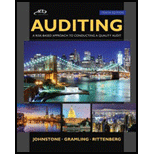
Concept explainers
Refer to Exhibit 2.5 and answer the following questions.
a. (Sections 101, 104, and 105) How does the establishment and operation of the PCAOB help to ensure quality external audits? How will audit firm inspections and investigations by the PCAOB help ensure high audit quality?
b. (Sections 201-203) How do Sections 201-203 address audit ()r independence concerns?
c. (Section 206) What is a cooling-off period, and how does it address auditor independence concerns?
d. (Section 301) How do the audit committee requirements help ensure effective corporate governance?
e. (Sections 302 and 906) How do the officer certification requirements help to address the risk of fraud in publicly traded organizations? What is the likelihood that a CFO who is committing fraudulent financial reporting would sign the certification falsely, and what are your reactions to that possibility?
f. (Section 401) How does this section relate to the Enron fraud?
g. (Section 404) How do the management assessment and audit or attestation of internal controls contained in this section help to address the risk of fraud in publicly traded
organizations?
h. (Section 407) Why is it important that at least one member of the audit committee be a financial expert? What are the financial reporting implications if the audit committee does not have any individuals serving on it who possess financial expertise?
i. (Section 802) How does this section relate to the Enron fraud?
Want to see the full answer?
Check out a sample textbook solution
Chapter 2 Solutions
Auditing: A Risk Based-Approach to Conducting a Quality Audit
- Titan Industries purchased a machine for $40,000 with a residual value of $6,000 and an estimated useful life of 12 years. What is the annual depreciation under the straight-line method? a) $3,087.05 b) $2,833.33 c) $2,500.55 d) $2,041.45Answerarrow_forwardAmount in account receivablearrow_forwardTitan Industries purchased a machine for $40,000 with a residual value of $6,000 and an estimated useful life of 12 years. What is the annual depreciation under the straight-line method? a) $3,087.05 b) $2,833.33 c) $2,500.55 d) $2,041.45arrow_forward
 Auditing: A Risk Based-Approach to Conducting a Q...AccountingISBN:9781305080577Author:Karla M Johnstone, Audrey A. Gramling, Larry E. RittenbergPublisher:South-Western College Pub
Auditing: A Risk Based-Approach to Conducting a Q...AccountingISBN:9781305080577Author:Karla M Johnstone, Audrey A. Gramling, Larry E. RittenbergPublisher:South-Western College Pub Auditing: A Risk Based-Approach (MindTap Course L...AccountingISBN:9781337619455Author:Karla M Johnstone, Audrey A. Gramling, Larry E. RittenbergPublisher:Cengage Learning
Auditing: A Risk Based-Approach (MindTap Course L...AccountingISBN:9781337619455Author:Karla M Johnstone, Audrey A. Gramling, Larry E. RittenbergPublisher:Cengage Learning Accounting Information SystemsAccountingISBN:9781337619202Author:Hall, James A.Publisher:Cengage Learning,Business/Professional Ethics Directors/Executives...AccountingISBN:9781337485913Author:BROOKSPublisher:Cengage
Accounting Information SystemsAccountingISBN:9781337619202Author:Hall, James A.Publisher:Cengage Learning,Business/Professional Ethics Directors/Executives...AccountingISBN:9781337485913Author:BROOKSPublisher:Cengage




